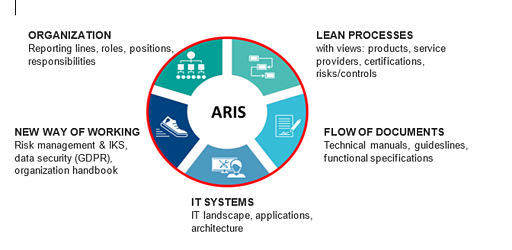WWE: Resilient in the face of change
The energy and utilities companies that are resilient, like trees that can bend in the wind, are the ones that will be able to weather the storm.

The energy and utilities sectors have been hit particularly hard, as demand and energy prices are very volatile due to the pandemic. Also, there are major challenges in terms of risk management – in addition to existing requirements for compliance, data protection and climate protection.
Westfalen Weser Energie (WWE), operator of regional electricity, gas and water networks for more than a million people in Germany, has some experience in stormy market conditions. WWE has a big ecosystem of service providers and plant operators and, due to its shareholding structure, new partners are added regularly, and processes must be continually adapted.
To operate efficiently, WWE had to be able to react immediately to changes, said Alex Kraus, head of Business Process and Risk Management, WWE. “For this it is essential that our employees understand the various processes and their dependencies and have them under control.”
WWE wanted to map process knowledge and responsibilities in an enterprise management system and to provide each employee with specific access.
In addition, risk management, the internal control system (ICS) and the map of IT systems had to be integrated with the process landscape. WWE’s credo is: “Every change in the company has an impact! Only a holistic view makes it possible to identify and evaluate them.”
Enterprise Management System
WWE decided to use ARIS as a cloud solution for its enterprise management system. It was then able to digitally map all important processes – with their essential functions and interfaces – today a total of 1,800 processes, 1,500 technical documentations, 500 integrated IT systems and 960 roles for around 900 employees.
There are different views of the process cockpit for management and all employees. They can now receive the information relevant to them in digital form, guaranteeing the fulfilment of all legal requirements as well as the securing of certifications.
The process portal offers employees an environment in which they can collaborate to improve processes together. The interaction via a digital, process-oriented work environment enables efficient and structured communication, even when employees work from their home office.

In addition, the protection of employees in the current situation through specific policies (e.g. on infection control and travel) is a high priority.
A so-called “read & understood” function ensures that policies are distributed quickly and allows control that they have been received and understood by each individual employee. This makes it possible to distribute new work instructions very quickly within the company and to bring them to application.
In the current crisis mode, companies need a quick solution to identify risks and assess the impact behind those risks. Based on this risk ranking, emergency procedures and work instructions are defined to keep the core processes running. When the end of the crisis is foreseeable, the aim is to gradually return to normality, but above all to learn lessons from the crisis: The keyword here is Business Continuity Management (BCM).
The current situation proves how difficult it is to predict every gale that can blow your company off track. But if you strengthen your resilience, both inside your organization and outside – partners, customers, supply chains – you could be tough enough to ride the next storm.